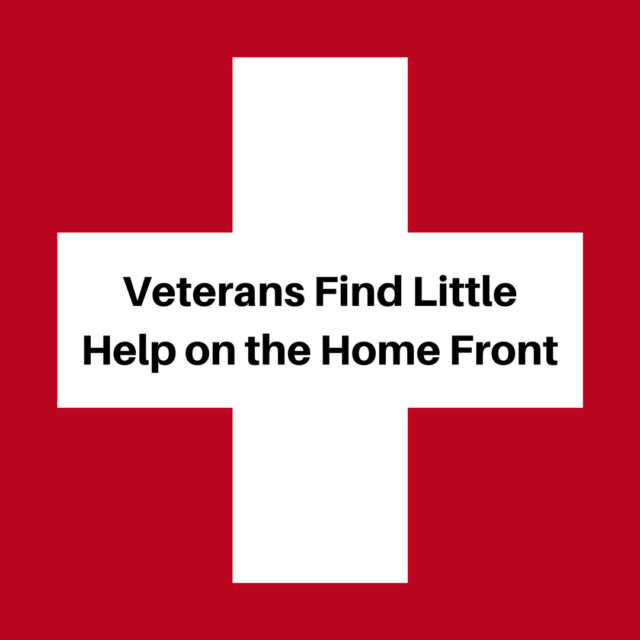In 2014 there was a big scandal at one of the VA Hospitals in Phoenix, Arizona. The staff there were accused of falsifying appointment records to make it look as though patients were properly meeting their doctor within two weeks of their appointments. The F.B.I. and an internal investigation showed that the hospital had operated maliciously by lying about appointment wait times, and forty patients are said to have died waiting.
“When the news of a VA in Phoenix, Arizona first came out I remember my coworkers and I to be very shocked,” says Claudette Araula, who is a registered nurse at the San Francisco Veterans Affairs Medical Center. “We were already overworked and constantly understaffed because we could not get new staff due to budget issues and another VA was trying to earn more budget by manipulating information.”
Together, veterans and nurses are saying that the Veterans Affairs needs to make changes in order to insure that wait times and access to their hospitals are up to standard. Not all veterans use their VA hospital because most are still young, live far away from one of the 170 medical centers in the country, and some veterans opt for private healthcare through their work.
It’s true that hospitals had financial incentives to decrease wait times from the administration, and falsifying those reports left some veterans and nurses to question the integrity of the system at the time. While there was good being done to make veterans feel welcomed and have their needs met, there was a possible schism.
In 1968 Earle Conklin, a United States Army veteran who fought during the Vietnam War, enlisted and traveled the world. Today he is retired and lives in Portland, Oregon. He was one of the originators of the “Take the Rock Veteran Swim Challenge” event, which is a combined swim meet that prepares veterans and their families to swim from Alcatraz to the beach. This is one of the joys Earle has after retirement, and he laughs at people who think it’s too cold to swim.
Healthcare, Earle iterates, has changed a lot since the 1960s. Communication and technology then was not as streamlined or as fast as it is now. While Earle remembers working in helicopters and helping soldiers get out of harm’s way and to medical assistance, he realizes how different the struggle is for him and his peers to find the best healthcare.
He stresses that “it is more of a question of economics than politics. Politicians will use this for politics.” Earle continues to express what a terrible situation 2014’s VA scandal was, and laments by saying, “I don’t know if it’s ever been cured.”
“Some of them, not all of them, are in it for themselves. A few people at the senior level of Veterans Affairs gained the system for only personal gain. And this happens in banking too and what you see happening at Wells Fargo creating fake accounts for profit,” shared Earle.
In response to the 2014 scandal, Congress implemented the Choice Program, which offered patients assistance with transportation and even helped patients find a hospital close to them.
“The choice program is actually a good idea,” stated Claudette. “We have several vets who live very far away from any VA facility and can’t travel by themselves and this program helps them connect to a specialist or primary doctor faster, but it needs to be better regulated. I have heard vets complaining that the MDs they go to try to ‘make money off the VA’ by sending them to specialist of getting test the do not need. Wait times today is still long due to having to many vets and not enough VA facilities and staff.”
The Choice Program, which can help patients find private doctors, has already exhausted its funds twice since August of last year and Congress provided 2.1 billion dollars of emergency funding for both incidents.
There is a mixed response about the program and towards any privatization of services that are offered by Veterans Affairs. The problem some have is that the Choice Program would take away monies that would be appropriated to Veterans Affairs.
Michael Blecker is the executive director at Swords to Plowshares, a non-profit group that specializes in the counseling, housing, and job training of veterans, and he cannot be more clear about what he sees as an attempt by President Trump’s administration to privatize healthcare.
“The V.A. shouldn’t pay them for private care and I worry about the veterans in the VA who are seeing money being taken away.” Michael expressed. “Right now the Choice Program is taking 200 to 400 million dollars a month in funding.”
Michael has his own opinion on the scandal that happened at the Veterans Affairs hospital in Phoenix. Although it was sad, he thought the scandal was blown way out of proportion and used by some to vilify Veterans Affairs while creating the Choice Program in response to the outcry.
“Money shouldn’t be diverted from the VA but the media and others got it twisted.” Michael continues to say that the news coverage about how patients were dying waiting for their appointments was sensationalized.
Veterans and nurses like Michael and Claudette both praise how healthcare has stepped forward to treat those with post-traumatic stress and depression, even if they were a veteran who never experienced combat.
“We provide service to vets from WWII, Korean, Vietnam war- during these times mental health was not a main concern when the vets retired – they are our sickest patients and at times with multiple chronic illness,” Claudette explains. “The focus on mental health started more during the Iraq and Afghanistan War, this patient population are hit most with the wait times and connecting them with primary physicians. There are also those vets that are from non combat times.”
Michael sees better preparation happening for the veterans who have come back from Iraq and Afghanistan. He especially sees that colleges like San Francisco State University and student veterans are starting clubs on campus for veterans.
He views these outlets as one of the best ways to return service people to finding the resources while seeking higher education. Again, he says the awareness of the stress that this population experiences has been more proactive than it was in the 1980s. He still is weary about the funding from Congress to the VA and about what he sees as money being taken away by The Choice Program. He also sees that responsibility falling on the current presidency.
“I am disheartened by what the Trump administration is doing“,” Michael lamented. “It’s death by a thousand cuts.”
Richard Hui is both a Marine veteran and a registered nurse at the San Francisco Veterans Affairs Medical Center. He knows both how to be a patient and a caregiver, and also sees a lacking of available hospitals.
“You can tell by the wait times,” Richard explains. “Palo Alto and San Francisco’s medical centers for veterans are very busy. Every time I pass by there I see it’s very packed. With long lines I can say there needs to be more hospitals.”
He’s familiar with wait times and how they often happen. Sometimes, he says, a patient will come in scheduled to be treated for one problem, but when the patient sees their doctor they can also say they are needing other treatment for other conditions they have. This is a common scenario that can increase wait times.
Richard details that appointments are sectioned, but that the appointments are not timed, however, fifteen minutes is sort of the average goal he says is given to each patient, and of course he says no one is turned away because they may have more problems after walking into the doctor’s office.
“I have the greatest respect for the physicians, and all the negative news we hear is usually about the administrators,” Army veteran Earle Conklin argues. “The care is exemplary, and it’s high quality.”
“As far as now, a lot of the Vietnam veterans, because of our age, are dying off,” Barry iterates “So now we’re looking at veterans after Vietnam.”
Barry never needed assistance from a VA hospital himself. Like many others he found healthcare provided through his work. As a San Francisco police officer, the department’s insurance paid for his medical treatment and the treatment for his daughter’s mitochondrial disease. He is thoughtful about the healthcare system today and only knows what he sees.
“They’re never the same when they come back. The entry back into society, you have to have a lot of counseling for veterans. And that’s expensive, so the VA is the one that has to do it,” the Army veteran affirms.






